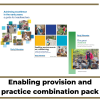Government urged to consider new funding options for early childhood education and care
A coalition of Early Years organisations convened by Kindred2 , including Early Education and providers such as LEYF and Ark Start, has identified a series
DfE has just published new figures on the number of new entrants to Early Years Initial Teacher Training (EYITT). This is the route that leads to Early Years Teacher Status, which does not have parity of career options to Qualified Teacher Status, despite requiring the same entry requirements and following a broadly similar programme of study. It is designed to boost the number of graduates working in the early years sector rather than increasing the number of teachers in schools with a sound understanding of the early years. However, sector funding leaves little scope for graduate level salaries, and action to increase the number of graduates in the sector has not been a government priority in recent years.
The good-ish news is that numbers are up from the all time low of 357 in 2019/20 to 477in 2021/22. However, it is an 18% decrease in new entrants compared to 2020/2021 (revised) when the figure was 581. It is well below the peak figure of 2,327 in 2013-14. As Jane Payler’s excellent analysis shows, this is a tiny faction of what is needed to put a graduate in every setting, with all the benefits that brings.
The recent announcements about the Early Years Recovery Programme promise “Substantially expanded numbers of places for initial teacher training in EY, to increase the supply of qualified graduates to the sector”. However, we have no detail yet as to how government plans to make the EYITT route more attractive to entrants, who are increasingly clued up on the better opportunities for pay, conditions and career progression offered by a QTS (Early Years) route. The sector is already worried that the increases in the hourly rate for 2022-23 will be eaten up by increases in the minimum wage. An increase in funding for trainees alone is unlikely to address these issues.
We welcome the government’s recognition that more graduates in the early years workforce would be a good thing, raising quality and improving children’s outcomes. We recognise that this is a long-term challenge that needs a long-term strategy to be achieved. We urge ministers to be ambitious in creating a 10 year workforce strategy to put a graduate in every early years setting, starting with those in areas of greatest deprivation, and creating a career structure for the workforce and a funding formula for the sector which rewards staff on a par with their peers in primary school.
A coalition of Early Years organisations convened by Kindred2 , including Early Education and providers such as LEYF and Ark Start, has identified a series
We urge members to respond to the two DfE consultations on funding and ratios which close on 16 September. For information, you can view the
We welcome today’s announcement from government that it intends to allocate a further £10m to raise the level of supplementary funding for those maintained nursery
The Times Education Commission has today published a report which calls for “A significant boost to early years funding targeted at the most vulnerable and
Government has today published its Schools White Paper “Opportunity for all”. We welcome the fact that early years gets a few mentions: However, the “key
Organisations representing Maintained Nursery Schools have joined together to warn the government that it must provide a long-term funding solution for Maintained Nursery Schools (MNS)
In response to the growing concerns of its membership related to children and their families living in poverty we asked members, in May last year,









Early Education
2 Victoria Square
St Albans
AL1 3TF
T: 01727 884925
E: office@early-education.org.uk